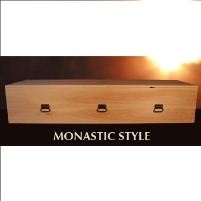Monks Fight Louisiana Funeral Industry over Right to Build Coffins
Saturday, August 14, 2010

In need of a new trade to make money for their monastery, the Benedictine monks of Saint Joseph Abbey in Covington, Louisiana, took up casketing-making a few years ago to help support themselves. But then the state board that regulates the funeral industry found out about the simple wooden caskets the monks were constructing and selling, and threatened the monastery with fines and criminal charges. Under state law, anyone working in the funeral business must be certified by the Louisiana State Board of Embalmers and Funeral Directors.
So the monks have filed a lawsuit against the state, arguing that “there is no rational relationship between the sale of handmade wooden caskets and a government requirement that a monastery become a funeral home.” The suit alleges that the licensing laws establish and preserve a “cartel for the sale of caskets in Louisiana.”
Deacon Mark Coudrain points out that a casket is not required for burial in Louisiana, and that a person can be buried directly in the ground or in a shroud. The monks also argue that their modest cypress caskets are in line with the growing movement to use biodegradable coffins to avoid contaminating the earth. The monks make two styles of caskets, traditional and monastic.
-Noel Brinkerhoff
Benedictine Monks Decry Cartel on Caskets (by Sabrina Canfield, Courthouse News Service)
St. Joseph Abbey’s Monks Battle State Funeral Industry Regulators for Right to Sell Caskets (by Ramon Antonio Vargas, New Orleans Times-Picayune)
St. Joseph Abbey v. Paul “West” Castille et al. (Courthouse News Service) (pdf)
- Top Stories
- Unusual News
- Where is the Money Going?
- Controversies
- U.S. and the World
- Appointments and Resignations
- Latest News
- Bashar al-Assad—The Fall of a Rabid AntiSemite
- Trump Announces He Will Switch Support from Russia to Ukraine
- Americans are Unhappy with the Direction of the Country…What’s New?
- Can Biden Murder Trump and Get Away With it?
- Electoral Advice for the Democratic and Republican Parties






Comments